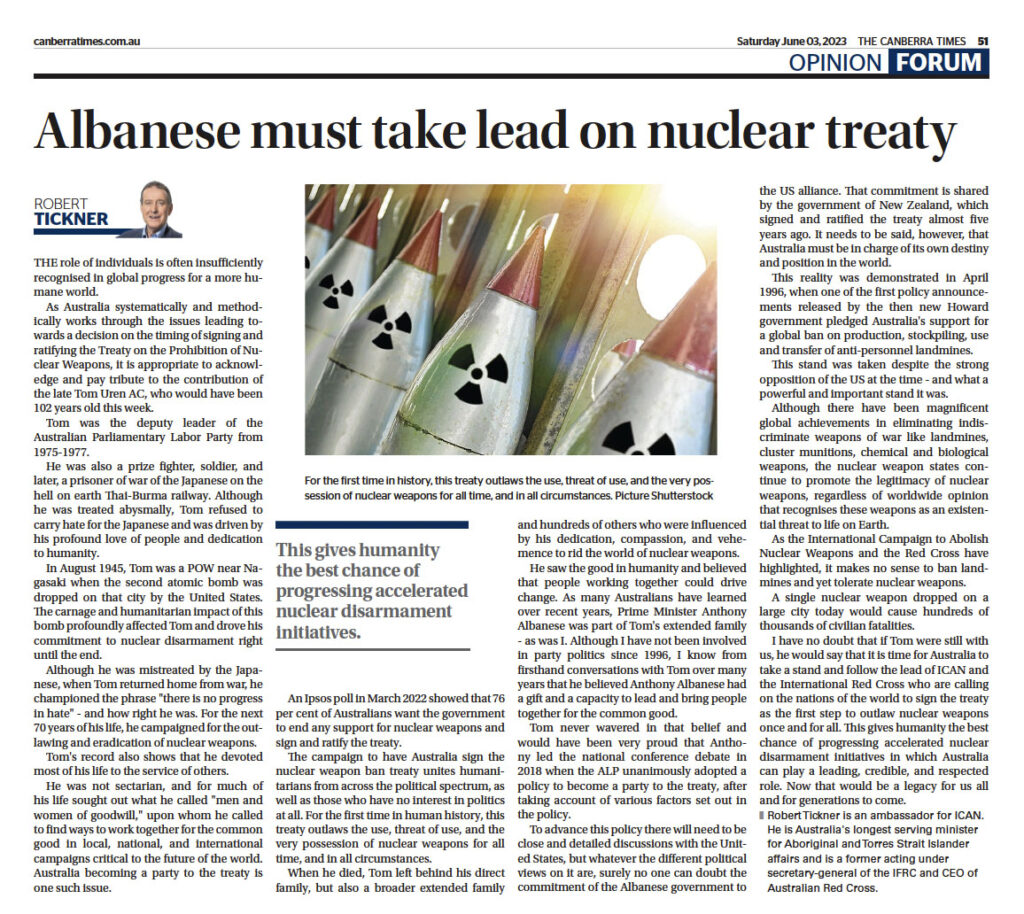CAMPAIGN NEWS:
Australia must take lead on nuclear treaty: Robert Tickner
By Robert Tickner
Canberra Times – Opinion
June 3rd, 2023
As Australia systematically and methodically works through the issues leading towards a decision on the timing of signing and ratifying the Treaty on the Prohibition of Nuclear Weapons, it is appropriate to acknowledge and pay tribute to the contribution of the late Tom Uren AC, who would have been 102 years old this week.
In August 1945, Tom was a POW near Nagasaki when the second atomic bomb was dropped on that city by the United States. The carnage and humanitarian impact of this bomb profoundly affected Tom and drove his commitment to nuclear disarmament right until the end.
Although he was mistreated by the Japanese, when Tom returned home from war, he championed the phrase “there is no progress in hate”- and how right he was. For the next 70 years of his life, he campaigned for the outlawing and eradication of nuclear weapons.
An Ipsos poll in March 2022 showed that 76 per cent of Australians want the government to end any support for nuclear weapons and sign and ratify the treaty. The campaign to have Australia sign the nuclear weapon ban treaty unites humanitarians from across the political spectrum, as well as those who have no interest in politics at all. For the first time in human history, this treaty outlaws the use, threat of use, and the very possession of nuclear weapons for all time, and in all circumstances.
When he died, Tom left behind his direct family, but also a broader extended family and hundreds of others who were influenced by his dedication, compassion, and vehemence to rid the world of nuclear weapons. He saw the good in humanity and believed that people working together could drive change. As many Australians have learned over recent years, Prime Minister Anthony Albanese was part of Tom’s extended family – as was I.
Although I have not been involved in party politics since 1996, I know from firsthand conversations with Tom over many years that he believed Anthony Albanese had a gift and a capacity to lead and bring people together for the common good. Tom never wavered in that belief and would have been very proud that Anthony led the national conference debate in 2018 when the ALP unanimously adopted a policy to become a party to the treaty, after taking account of various factors set out in the policy.
To advance this policy there will inevitably need to be close and detailed discussions with the United States, but whatever the different political views on this issue are, surely no one can doubt the commitment of the Albanese government to the US alliance. That commitment is shared by the government of New Zealand, which signed and ratified the treaty almost five years ago.
Although there have been magnificent global achievements in eliminating indiscriminate weapons of war like landmines, cluster munitions, chemical and biological weapons, the nuclear weapon states continue to promote the legitimacy of nuclear weapons, regardless of worldwide opinion that recognises these weapons as an existential threat to life on Earth.
As the International Campaign to Abolish Nuclear Weapons and the Red Cross have highlighted, it makes no sense to ban landmines and yet tolerate nuclear weapons. A single nuclear weapon dropped on a large city today would cause hundreds of thousands of civilian fatalities.
I have no doubt that if Tom were still with us, he would say that it is time for Australia to take a stand and follow the lead of ICAN and the International Red Cross who are calling on the nations of the world to sign the treaty as the first step to outlaw nuclear weapons once and for all. This gives humanity the best chance of progressing accelerated nuclear disarmament initiatives in which Australia can play a leading, credible, and respected role.
Now that would be a legacy for us all and for generations to come.
• Robert Tickner is an ambassador for ICAN. He is Australia’s longest serving minister for Aboriginal and Torres Strait Islander affairs and is a former acting under secretary-general of the IFRC and CEO of Australian Red Cross.

